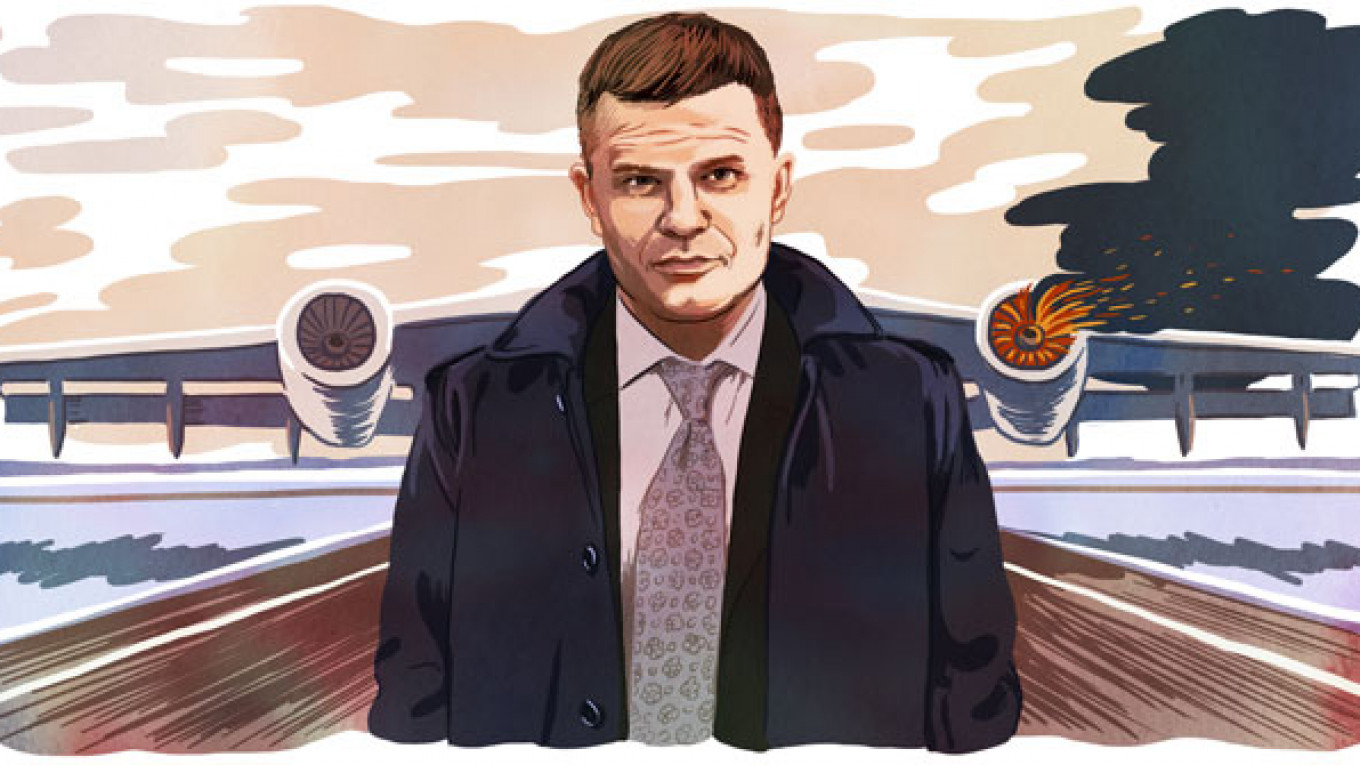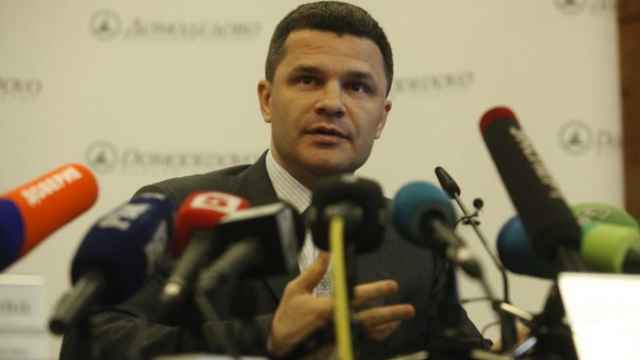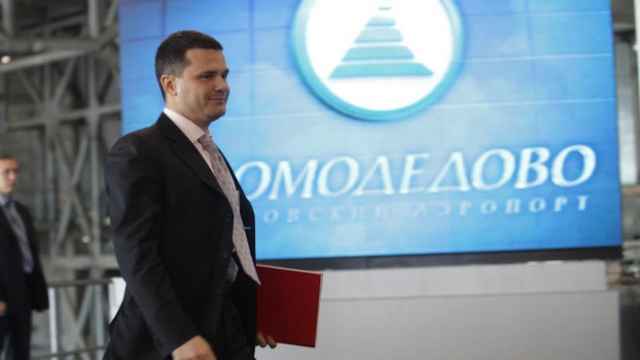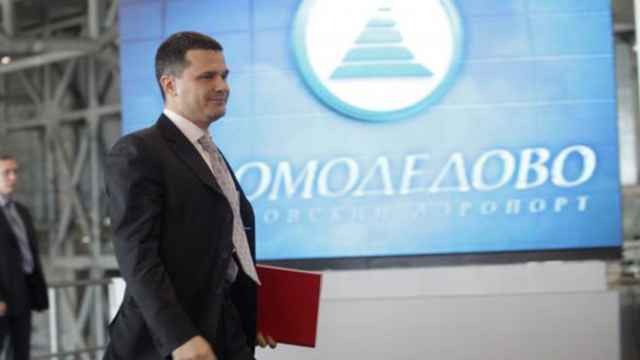On the morning of Feb. 18, Dmitry Kamenshchik, Russia's 27th-richest tycoon, packed a backpack with some spare clothes, a toothbrush, and shoes without laces — the essentials for a stint in prison.
The billionaire owner of Moscow's Domodedovo Airport was unemotional, says his lawyer. Ten days earlier, three current and former executives at the airport were jailed. Kamenshchik weighed the odds, and figured the chance of joining them was high.
He arrived in Moscow from his suburban woodland house around midday. For seven monotonous hours, he sat with an investigator in a cramped room on the eighth floor of an office block; a room that seemed not to have been decorated since the days of the Soviet Union.
Once the paperwork was filed, FSB operatives escorted him to a cell. He had been accused of indirect responsibility for the deaths of 37 people following a terror attack at his airport in 2011.
The arrest created instant shockwaves. Investigators say the airport's security system was criminally lax. Everyone else — pundits, lawyers, business people — says the charges are trumped-up, legally baseless, and are being used to strip him of his airport. Kamenshchik and his colleagues face up to 10 years in prison if found guilty.
The case has prompted comparisons with Vladimir Gusinsky, Mikhail Khodorkovsky and Vladimir Yevtushenkov — Russian billionaires who were jailed on questionable charges and lost some or all of their assets under President Vladimir Putin.
Kamenshchik's lawyer, Mikhail Kolpakov, recounted a conversation between state investigators and his client that demonstrated the cynicism of the situation. As the session wound up, the incredulous investigator asked Kamenshchik why, having watched the imprisonment of his colleagues days earlier, he had not fled the country.
"Why run?" the 47-year-old said. "I know the truth is on my side."
Autistic Genius
Kamenshchik's reply showed a stubbornness that may complicate any attempt to take Domodedovo away from him.
"He is devoid of emotion, feelings and personal connections," says Sergei Kapchuk, a former Russian state official who knew him in the 1990s. "His business is everything. He is a machine for making money."
When Kapchuk met him in 1992, Kamenshchik had just quit a philosophy course and was helping run an airline tour company, working out of a three-room apartment in southwest Moscow that he shared with his girlfriend and her young son.
Kapchuk said that one day, two men broke into the apartment. They put a grenade to the boy's head and said, "hand over your cash or we all die." Losing the money would have meant the end of Kamenshchik's business. Without a word, Kamenshchik threw himself across the room, wrested the grenade from the hands of the bandits and bundled them out.
"He's practically autistic," says Anton Bakov, a businessman and politician who gave him his first job in the aviation business in the early 1990s. Bakov, like everyone who has met him, agrees that Kamenshchik is a business genius.
Kamenshchik started managing small charter flights for Bakov in 1990, ferrying Polish tourists via Moscow to Asia with "perfect" efficiency. By about 1992 the two men were flying Russia's emerging class of small traders to China. There, the passengers would disembark, buy as many electronics and clothes as they could stuff into a suitcase, and haul them back to Russia to sell at a profit. Kamenshchik went solo with an airline, East Line, and began flying freight. In the mid-1990s, he began his work at Domodedovo.
Back then, Domodedovo, 20 kilometers south of Moscow, was in shambles. During the Soviet era, the airport handled internal flights to Central Asia and Russia's eastern regions. It was small, chaotic, and had nowhere to sit. There was frequently standing room only on the flights also. Kamenshchik and East Line began to cut deals with the airport to improve its infrastructure section by section. On the way, he privatized the buildings and consolidated his ownership.
Under him, Domodedovo became the first modern Russian airport. In 2002 he launched a fast train connection between Domodedovo and central Moscow. There weren't any trains, so he bought factories to build some. The old concrete terminal disappeared under new glass and steel. Over a decade and a half, Kamenshchik says he plowed more than $1.5 billion of private investment into Domodedovo. By the mid-2000s, it was the largest airport in the country; in 2014, it was processing more than 30 million passengers a year and Kamenshchik said it was worth more than $8 billion.
As another of Russia's superstar businessmen, Yevgeny Chichvarkin, once put it: "Out of s**t he made a chocolate candy."
Do You Understand?
It wasn't all smooth sailing. As the airport became more successful, it faced relentless litigation. In total, some 6,500 legal cases had been brought against the airport since 2001, Kamenshchik said in an interview with the Vedomosti business newspaper in 2014. Among them were accusations that East Line transported contraband. In the mid-2000s, the government fought a four-year battle to annul Domodedovo's privatization and return it to state ownership. Kamenshchik said Domodedovo had a team of more than 100 in-house lawyers to deal with the caseload.
Sometimes these conflicts turned ugly. In 2011 a video of Kamenshchik's business partner, Valery Kogan, cavorting with two young men in skimpy underwear was leaked to the internet.
The pressure has made Kamenshchik risk averse, even paranoid. For more than a decade he hid his ownership behind a series of offshore front companies to reduce his vulnerability to takeovers and attacks. He told Vedomosti he was often unsure whether a constant stream of checks, inspections and lawsuits was the state performing its legitimate function as overseer or motivated by malign interests.
His defense strategy is one that befits a man who is almost autistic — to be pedantic about the letter of the law. He denies using kickbacks and cutting deals with influential figures. He says intense attention from authorities is "a kind of penalty" for his refusal to play by a corrupt rulebook. The airport's lawyers have knocked back most of the accusations.
But uncertainty created by the stream of litigation has hampered investment. The government has taken years to approve new runways and expand road links to allow the airport to grow. Together this has slowed the pace of Domodedovo's development and allowed Moscow's two other airports, Sheremetyevo and Vnukovo, to catch up. Both those airports are co-owned by the government.
The worries keep coming. A few years ago Kamenshchik was approached by a potential buyer for Domodedovo. Kamenshchik says he was told: "You do understand? … They'll take it all. Or unite it with state airports. If you don't agree to our terms you'll be making the biggest mistake of your life."
New Attack
A new opportunity to pressure Domodedovo emerged out of tragedy.
On Jan. 24, 2011, a 20-year-old named Magomed Yevloyev carried up to 5 kilograms of explosives past security personnel into the airport. He had been sent to Moscow from a village in Russia's North Caucasus by Islamist separatists. Melding with the crowds in the terminal building, he detonated a device under his shirt, killing 37 people and wounding more than 170.
Investigators immediately sought to prove that Domodedovo's management and owner shared responsibility for the crime. They say airport security should have made everyone entering the building pass through a metal detector, which could have enabled them to discover Yevloyev's bomb.
The investigators' arguments have been repeatedly discredited. Several Russian courts have ruled there was no law that obliged Domodedovo to conduct total checks at all entrances and that there was no wrongdoing by the airport. Russia has suffered hundreds of terrorist incidents in recent years, including fatal bombings on trains and in Moscow's metro. In none have either the owner or management been prosecuted.
Nevertheless, investigators last summer suddenly revived the case. On Feb. 8 and 9, two former Domodedovo executives, Svetlana Trishina and Vyacheslav Nekrasov, and one acting top manager at the airport, Andrei Danilov, were arrested. Ten days later, Kamenshchik joined them behind bars.
The precise motivation for the case is murky, but it certainly appears to be being directed from above. An indication of this came when the investigator handling the case on the night of his detention suddenly softened his position from calling for Kamenshchik to be kept in jail to seeking house arrest. Kolpakov, the lawyer, suspects that he received a call during the night from someone further up the line.
Backing for the case may go as high as President Putin. A source close to the Kremlin told The Moscow Times the switch to house arrest could not have happened without Putin's involvement. Investigators have persistently sought to convince the president that Kamenshchik was avoiding paying compensation to victims of the terror attacks and deserved investigation, the source said, but in the event there was no support for his imprisonment.
The justification offered to Putin is echoed in public statements by investigators, which accuse Domodedovo of being too greedy to be concerned with airport safety or compensation. But most onlookers say the real reason for the investigation is to force Kamenshchik to sell Domodedovo at the cheapest price.
Kamenshchik has consistently refused to share control of the airport. At the start of the 2010s, he resisted government plans to merge it with Moscow's two state airports. Now, the government is pursuing a new concept of public-private ownership involving businessmen friendly to the authorities. Arkady Rotenberg, a friend and former judo partner of Putin's, has taken a stake in Sheremetyevo. Many think he wishes to expand.
And Domodedovo looks like an increasingly attractive acquisition. The airport is profitable, and Russia's economic slump is reducing the quantity of easy money in the country.
Pressure
Kamenshchik and the other defendants now face up to a year and a half in detention. State prosecutors have said the case against them is flawed, which means that trial and sentencing are unlikely, says Kolpakov. But investigators can spin out the investigation for as long as they like, he said. The only limiting factor is that a suspect can be held for a maximum of 18 months without the case reaching court.
Kamenshchik may be under house arrest rather than in a prison cell, but the pressure on him is still strong. The detention of Trishina, Nekrasov and Danilov is one way to increase it. Their incarceration increases the psychological pressure on Kamenshchik — a tactic used in previous Russian trials. None of the three have been questioned in the two weeks since they were detained, says Kolpakov. Trishina, who has two young children, was granted house arrest by a court on Wednesday.
One lawyer described their situation as "light torture." According to the Kremlin source, Kamenshchik's partner Kogan tried to pull strings to get them all out of jail, but failed.
No one who knows Kamenshchik thinks he will give up the airport easily. He and Domodedovo are inseparable, said Bakov, "They've fused together."
Kolpakov said that when Kamenshchik emerged from his night in the cell on Feb. 19 he was calm and composed. He walked down the hallways of the court building in a hooded sweater like a boxer, flashing an occasional sardonic smile beneath thick dark hair and heavy brows. He told the court: "I devoted 22 years of my life to this airport. To me it is a question of honor to see this case to the end and demonstrate that neither I nor employees of this airport are guilty."
Bakov said even the threat of 10 years in jail wouldn't spook him. Kamenshchik in Russian means stonemason. From there came his nickname — "The Stone." Friends describe him as immovable.
In 2014, Kamenshchik told Vedomosti that he insisted on following the letter of the law "because we believe it's more reliable" than depending on personal relationships. But, he added, "whether that's the best survival strategy — time will show."
Contact the author at [email protected]. Follow the author on Twitter at @peterhobson15
A Message from The Moscow Times:
Dear readers,
We are facing unprecedented challenges. Russia's Prosecutor General's Office has designated The Moscow Times as an "undesirable" organization, criminalizing our work and putting our staff at risk of prosecution. This follows our earlier unjust labeling as a "foreign agent."
These actions are direct attempts to silence independent journalism in Russia. The authorities claim our work "discredits the decisions of the Russian leadership." We see things differently: we strive to provide accurate, unbiased reporting on Russia.
We, the journalists of The Moscow Times, refuse to be silenced. But to continue our work, we need your help.
Your support, no matter how small, makes a world of difference. If you can, please support us monthly starting from just $2. It's quick to set up, and every contribution makes a significant impact.
By supporting The Moscow Times, you're defending open, independent journalism in the face of repression. Thank you for standing with us.
Remind me later.






